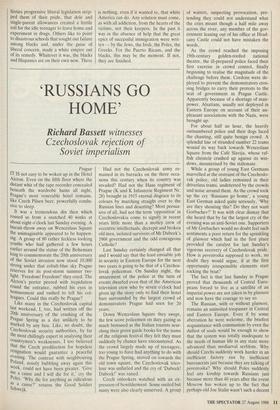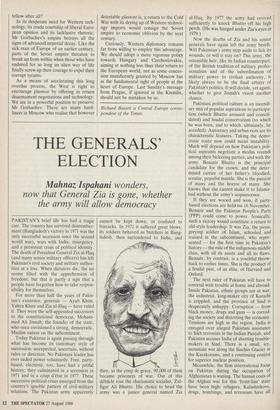'RUSSIANS GO HOME'
Richard Bassett witnesses
Czechoslovak rejection of Soviet imperialism
Prague IT IS not easy to be woken up in the Hotel Alcron. Even on the fifth floor where the distant whir of the tape recorder concealed beneath the wardrobe hums all night, Prague's most venerable hotel remains, like Czech Pilsen beer, powerfully condu- cive to sleep.
It was a tremendous din then which roused us from a snatched 40 winks at about eight o'clock last Sunday evening. A biscuit-throw away on Wenceslaus Square the unimaginable appeared to be happen- ing. A group of 80 rather feckless looking Youths who had gathered a few hours earlier around the statue of the Bohemian king to commemorate the 20th anniversary of the Soviet invasion now stood 10,000 strong under that cobalt-blue sky Prague reserves for its post-storm summer twi- light. 'Freedom! Freedom!' they cried. The Alcron's porter peered with trepidation round the entrance, rubbed his eyes in bemusement and rushed to tell his col- leagues. Could this really be Prague?
Like many in the Czechoslovak capital last weekend, I, too, had written off the 20th anniversary of the crushing of the Prague Spring as a day unlikely to be marked by any fuss. Like, no doubt, the Czechoslovak security authorities, by far the most chillingly expert in analysing their countrymen's weaknesses, I too believed that the Czech predilection for hopeless resignation would guarantee a peaceful evening. The contrast with neighbouring Poland, noisily bubbling away again this week, could not have been greater. 'Give me a cause and I will die for it,' cry the P°Ies. 'Why die for anything as ridiculous as a cause?' returns the Good Soldier Schwej k.
Had not the Czechoslovak army re- mained in its barracks on the three occa- sions this century when its country was invaded? Had not the Haus regiment of Prague (K und K Infanterie Regiment Nr. 28) brought in 1915 eternal disgrace to its colours by marching straight over to the Russian lines and deserting? Most persua- sive of all, had not the term 'opposition' in Czechoslovakia come to signify in recent years little more than a motley crew of eccentric intellectuals, decrepit and broken old men, isolated survivors of Mr Dubcek's 1968 government and the odd courageous Catholic?
Last Sunday certainly changed all that and I would say that the least enviable job in security in Eastern Europe for the next two years is going to be that of a Czechos- lovak policeman. On Sunday night, the amazement of the police at the turn of events dwarfed even that of the American television crew who by seven o'clock had given up the story only to find their hotel bars surrounded by the largest crowd of demonstrators Prague had seen for 20 years.
Down Wenceslaus Square they swept, the few score policemen on duty gazing as much bemused as the Italian tourists sear- ching their green guide books for the name of the religious festival they felt they must suddenly by chance have encountered. As the crowd largely made up of teenagers, too young to have had anything to do with the Prague Spring, moved on towards the old town square, the Czechoslovak trico- lour was unfurled and the cry of 'Dubcek! Dubcek!' was raised.
Czech onlookers watched with an ex- pression of bewilderment. Some smiled but many were also clearly unnerved. A group of waiters, suspecting provocation, pre- tending they could not understand what the cries meant though a half mile away across the river, any member of the gov- ernment leaning out of his office at Hrad- cany Castle could not have mistaken the words.
As the crowd reached the imposing 19th-century golden-roofed national theatre, the ill-prepared police faced their first exercise in crowd control, finally beginning to realise the magnitude of the challenge before them. Cordons were de- ployed to prevent the demonstrators cros- sing bridges to carry their protests to the seat of government in Prague Castle.
Apparently because of a shortage of man- power, Alsatians, usually not deployed in Eastern Europe on account of their un- pleasant associations with the Nazis, were brought up.
For about half an hour, the heavily outnumbered police and their dogs faced the chanting, still quite benign crowd. A splendid line of stranded number 22 trams wound its way back towards Wenceslaus Square from the Café Slavija, whose raf- fish clientele crushed up against its win- dows, mesmerised by the stalemate.
While a group of young East Germans marvelled at the restraint of the Czechoslo- vak police, old ladies remained in their driverless trams, undeterred by the crowds and noise around them. As the crowd took up the cry 'Russians go home', a young East German asked quite seriously, 'Why are they shouting this? Do they not want Gorbachev?' It was with clear dismay that she heard that by far the largest cry of the evening was an anti-Soviet one. Supporters of Mr Gorbachev would no doubt feel such
sentiments a poor return for the sprinkling of glasnost which had in the first place
provided the catalyst for last Sunday's
vigorous recovery of Czechoslovak pride. How is perestroika supposed to work, no
doubt they would argue, if at the first opportunity irresponsible elements start rocking the boat?
The fact is that last Sunday in Prague proved that thousands of Central Euro-
peans forced to live as a satellite of an imperial power are not taken in by glasnost and now have the courage to say so.
The Russian, with or without glasnost, remains an uninvited trespasser in Central
and Eastern Europe. Even if by some aberration he were welcome, the briefest acquaintance with communism by even the dullest of souls would be enough to show that the system was totally inadequate to the needs of human life in any state more advanced than mediaeval serfdom. Why should Czechs suddenly work harder in an inefficient factory run by inefficient bureaucrats just because they are talking of
perestroika? Why should Poles suddenly feel any kinship towards Russians just
because more than 40 years after the event Moscow has woken up to the fact that perhaps old Joe Stalin wasn't such a decent fellow after all?
In its desperate need for Western tech- nology, its crude courtship of liberal Euro- pean opinion and its lacklustre rhetoric, Mr Gorbachev's empire betrays all the signs of advanced imperial decay. Like the sick man of Europe of an earlier century, parts of the Soviet empire threaten to break up from within when those who have endured for so long an alien way of life finally screw up their courage to expel their corrupt tyrants.
As a means of accelerating this long overdue process, the West is right to encourage glasnost by offering in return disarmament negotiations and technology. We are in a powerful position to preserve Mr Gorbachev. There are many hard- liners in Moscow who realise that however detestable glasnost is, a return to the Cold War with its drying up of Western technol- ogy imports would consign the Soviet empire to economic oblivion by the next century.
Curiously, Western diplomacy remains far from willing to employ this advantage. We should adopt a more vigorous policy towards Hungary and Czechoslovakia, aiming at nothing less than their return to the European world; not as some conces- sion munificently granted by Moscow but as the fundamental right of people at the heart of Europe. Last Sunday's message from Prague, if ignored in the Kremlin, should not be mistaken by us.
Richard Bassett is Central Europe corres- pondent of the Times.















































 Previous page
Previous page